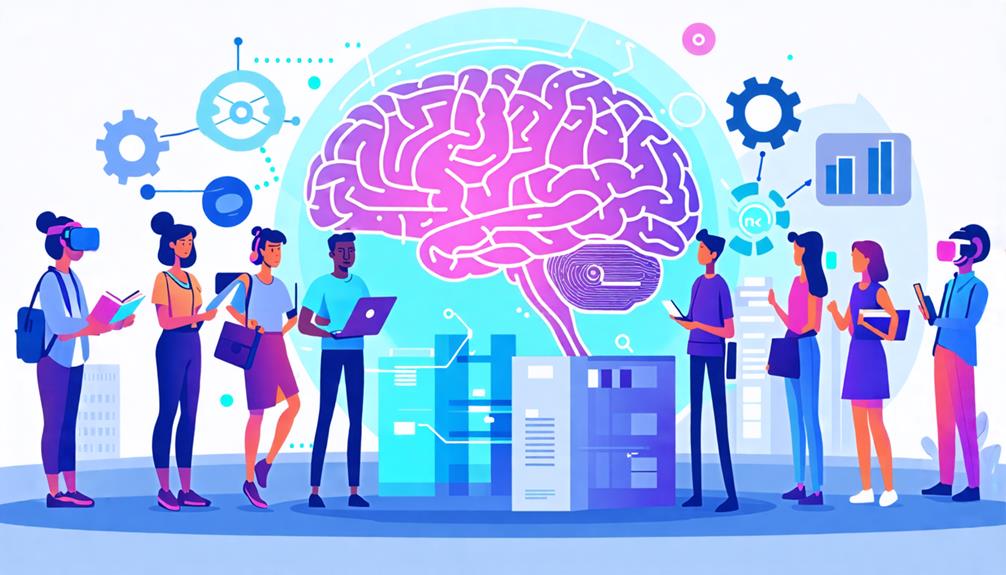
In your search to understand who owns the most AI, you'll find that tech giants like Google, IBM, and Microsoft hold significant control over the current AI technology landscape. Google's DeepMind and IBM's Watson are pioneering advancements in solving real-world problems and improving healthcare efficiency, respectively. Microsoft enhances business efficiency by integrating AI into their cloud services. These companies dominate due to heavy investments and vast resources, which allow them to lead in innovation, set market trends, and influence regulatory frameworks globally. New sectors and players emerge, but they face challenges to match the scale and influence of these leaders. Stick around to uncover more on how this shapes the future of industries and technologies.
Key Players in AI Ownership

Several major companies dominate the AI landscape, each wielding significant influence over the technology's development and application. You'll find that the likes of Google, IBM, and Microsoft lead this charge, exploring and pushing the boundaries of what AI can do.
Google's DeepMind, for instance, isn't just about winning games; it's pioneering AI research to solve real-world problems. IBM's Watson, on the other hand, has made headlines by diving into healthcare, offering insights that assist in diagnosing diseases faster than ever.
Then there's Microsoft, leveraging its AI to enhance cloud computing services and offer solutions that integrate seamlessly with everyday business operations. They're not just creating AI; they're integrating it into tools you might use every day.
Behind these giants, there's a cadre of startups nipping at their heels, each carving out niches. These nimble players often innovate at a rapid pace, pushing the big names to keep evolving or risk falling behind. It's a dynamic playing field where patents, research breakthroughs, and collaborations play crucial roles in shaping the future.
Industries Dominating AI
Beyond the major companies, specific industries stand out in their adoption and advancement of AI technology. You'll find that healthcare, finance, and automotive sectors are particularly forward-thinking in integrating AI into their daily operations.
In healthcare, AI's impact is profound. It's revolutionizing patient care with predictive analytics for disease management and personalized treatment plans. Hospitals are using AI to streamline administrative processes too, ensuring you're treated quicker and more efficiently.
Turning to finance, AI is a game changer. It's not just about automating tasks; it's also enhancing security and fraud detection. Banks are employing AI to offer you personalized financial advice and more responsive customer service. They're relying on complex algorithms to make sense of massive data sets, helping them make better investment decisions on your behalf.
Lastly, the automotive industry is pushing the envelope with AI, particularly in developing autonomous vehicles. From improving safety features to optimizing supply chain logistics, AI is making cars smarter. You're not just a passenger; you're part of an integrated, intelligent system that learns from your habits and preferences.
These industries aren't just using AI; they're fundamentally reshaping their futures with it, ensuring they stay relevant in an ever-evolving technological landscape.
Global AI Ownership Trends

As we examine global AI ownership trends, you'll notice a shift toward consolidation with major tech firms increasingly dominating the landscape. This centralization isn't confined to Silicon Valley; it's a worldwide phenomenon. Giants from China, the U.S., and Europe are snapping up innovative startups and securing patents at an accelerated rate, expanding their influence across the globe.
You'll find that these powerhouses aren't just investing in AI for their immediate needs but are also shaping the future direction of AI technologies. They're positioning themselves at the forefront of research and development, which allows them to set standards and influence regulatory frameworks internationally. This strategic positioning ensures that they stay ahead in the race, keeping their grip tight on the market's reins.
Moreover, the focus isn't solely on generic AI solutions. There's a keen interest in specialized AI applications ranging from healthcare diagnostics to autonomous driving which suggests a targeted approach toward monopolizing certain high-value sectors.
Impact on Market Competition
This consolidation in AI ownership significantly affects market competition as it limits the entry of new players. When a few companies hold the reins on advanced AI technologies, they set high barriers for others trying to break into the field. You'll see that these giants dictate terms and pricing, squeezing out startups and smaller businesses who can't afford the steep costs of AI development and integration.
Moreover, this dominance stifles innovation. With fewer entities controlling AI advancements, there's less diversity in the types of solutions and applications being developed. You're stuck with what's available, which mightn't always align with your needs or spark further innovation. Competition typically fuels better products and services, but with restricted competition, improvement plateaus.
You also face a market where consumer choices are limited. Dominant players tend to prioritize their interests over consumer needs, potentially leading to a lack of tailored solutions. This can result in a one-size-fits-all approach to technology that doesn't necessarily meet the specific demands or challenges of various industries. Ultimately, this scenario restricts your ability to choose from a wide range of options, forcing you to adapt to whatever is available rather than what's best.
Future Predictions for AI Control

Looking ahead, you'll notice that the control over AI is likely to become even more concentrated among a few tech giants. This isn't just a fluke; it's a result of massive investments and strategic acquisitions that cement their dominance. You can expect these companies to push the boundaries of AI technology, focusing largely on enhancing their proprietary systems and platforms.
As you look further into the future, you'll see that this concentration of power might lead to a significant barrier for new entrants. Breaking into the AI market will require not only innovative ideas but also substantial capital and strategic partnerships. You'll find that smaller companies and startups might struggle to compete unless they carve out niche markets or collaborate with bigger players.
Moreover, governments and regulatory bodies will likely step in to oversee and manage the influence of these tech giants. You'll see more discussions and potential regulations aimed at ensuring competition and preventing monopolistic control.
It's crucial that you stay informed about these changes, as they'll shape the landscape of AI development and deployment. Understanding these dynamics will help you anticipate shifts in the tech industry and adjust your strategies accordingly.
Frequently Asked Questions
How Do Intellectual Property Laws Affect AI Ownership Rights?
Intellectual property laws determine your rights over AI creations, ensuring you're recognized and rewarded for your innovations. They protect against unauthorized use, helping you maintain control and potentially profit from your AI developments.
What Ethical Concerns Arise From Concentrated AI Ownership?
You face ethical concerns like power imbalances and privacy violations when few entities control AI. It's crucial to ensure diverse ownership to prevent exploitation and promote innovation across different sectors and communities.
Can Individual Consumers Own AI Technology?
Yes, you can own AI technology, such as smart assistants or personalized recommendation systems. These tools are increasingly available for individual use, enhancing your daily life and tasks with their advanced capabilities.
How Does AI Ownership Impact Data Privacy?
AI ownership can seriously affect your data privacy, as control over AI tools determines how your personal information is used, shared, or protected. It's crucial to know who's behind the technology you're using.
Are There International Agreements Regulating AI Ownership?
You'll find that international agreements on AI ownership are limited. Nations are still navigating how to regulate this complex field, often dealing with issues like intellectual property rights and ethical standards separately.
Conclusion
As you've seen, AI ownership is concentrated among tech giants and leading industries, reshaping global market dynamics. This consolidation influences competition and innovation, potentially stifling smaller players.
Looking ahead, expect tighter regulations and emerging contenders challenging the status quo. You'll likely witness a dynamic shift in control as new technologies and policies come into play, ensuring a more diversified and competitive AI landscape.
Stay informed and ready to adapt in this fast-evolving field.






